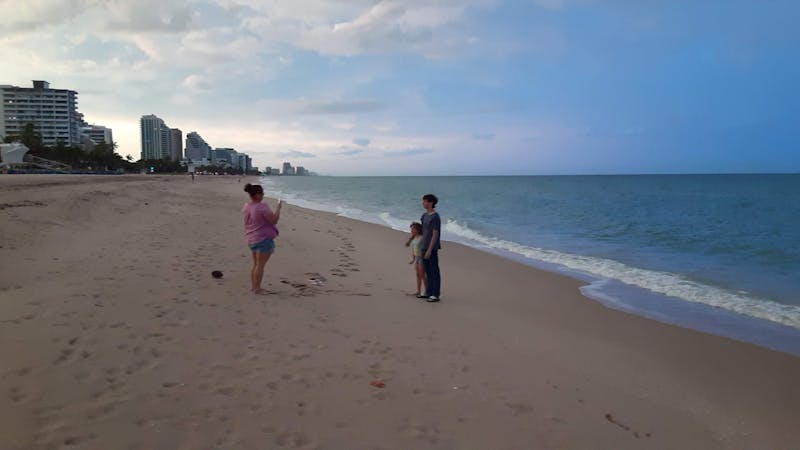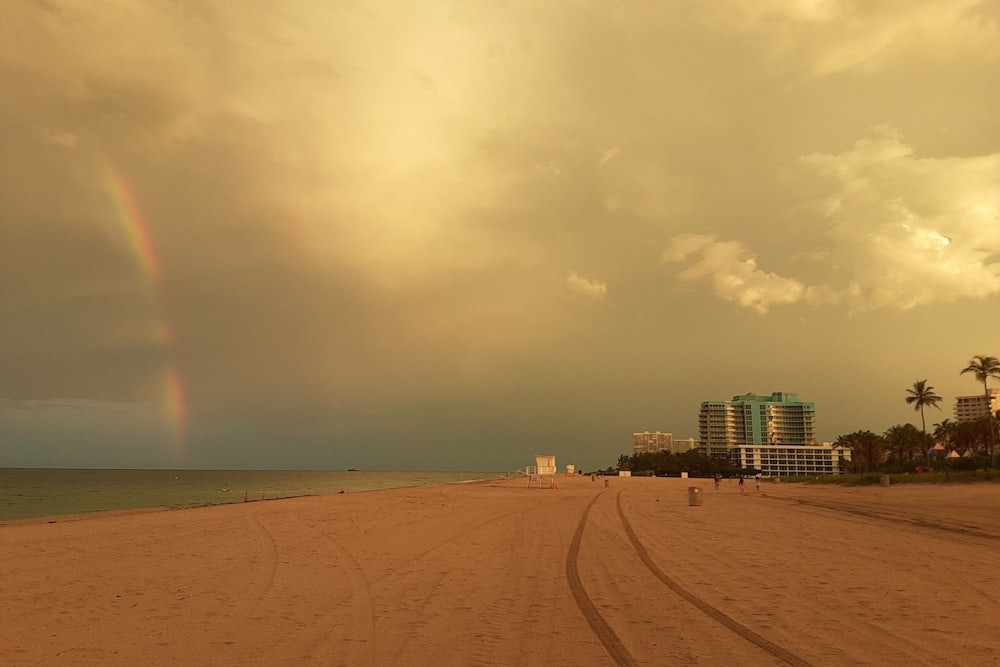I live three miles from ground zero for coronavirus-shaming in America. Eons ago, in early March, the reality of the pandemic was taking hold, and public officials—at least, the ones who hadn’t dismissed the virus as fake news—began to prescribe “social distancing” and limiting travel as preventive measures. Spring-breaking students, however, had already made hotel reservations and plans to live forever; they flocked to Fort Lauderdale, my home, as they do every year, and they writhed together on the beach like hogs in a slaughterhouse yard. Photos and videos from the scene spread across social media, outraging people who were—one assumes—already doing their part to contain the spread of the virus.
That beach bacchanalia wasn’t just a focal point for national anger. It was a literal viral moment, contributing to the spread of the novel coronavirus across the country.
Want to see the true potential impact of ignoring social distancing? Through a partnership with @xmodesocial, we analyzed secondary locations of anonymized mobile devices that were active at a single Ft. Lauderdale beach during spring break. This is where they went across the US: pic.twitter.com/3A3ePn9Vin
— Tectonix GEO (@TectonixGEO) March 25, 2020
Fort Lauderdale officials raced to shut down the beach and limit bar crowds before a possible St. Patrick’s Day super-spreading event. That was a week before Florida’s dithering Trumpesque governor, Ron DeSantis, finally closed beaches statewide. The Lauderdale coastline has been empty ever since—at least until its reopening on Tuesday, when I decided to swing by for a brief tryst with the Atlantic.
I grew up on this beach, swimming miles up the shore, drinking underage at the grody bars, skin-diving with friends off rocky outcroppings in the ocean. But I was scared to go there on Tuesday. I had read about the crowded scenes elsewhere at reopened beaches in North Florida and Southern California. A beach reopening in Jacksonville, and the ensuing drone photos of teeming hordes of humanity pressed together in the sand, had led #FLORIDAMORONS to trend on Twitter. What if thousands of other South Floridians had the same idea?
Despite my own steps to avoid catching or spreading the coronavirus, I’ve been hesitant to quarantine-shame beachgoers, with exceptions for the ninnies of the Ozarks and Alabama Gulf Coast whose zeal for FREEDOM leads them to repudiate the concept of personal space. First, beaches and outdoor parks—where open air can disperse virus-filled aerosols and droplets and ultraviolet radiation can shorten their lifespans—aren’t all that dangerous, particularly compared with indoor spaces.
Here in Broward County, nearly half of Covid-related deaths occurred in about two dozen senior care centers. Sixteen people died in a nursing home near me that’s about five minutes’ drive from the beach. Killing the elderly without repercussions is a pastime for Florida governments: As governor during Hurricane Irma, Rick Scott, now a U.S. senator, famously deleted desperate voicemails on his personal phone from a Broward senior home where power outages ultimately killed 12 patients. But there’s been a widespread lack of concern for elderly care amid this crisis, while beachgoer photos get thousands of viral hate-shares online. “For months, New York sent more than 4,300 recovering elderly COVID patients back to nursing homes because of a [Cuomo] directive,” sociologist Zeynep Tufekci complained on Twitter. “I don’t get how this isn’t the biggest news. The core issues aren’t the beaches, the parks or the unmasked joggers passing by.”
That said, beach access is always a core issue for the state’s coastal residents. “A lot of people who grew up here think of it as, ‘That’s my beach,’” says longtime Tampa Bay–area reporter Craig Pittman. “If you can’t go to the beach, what is Florida?” It’s long been a point of pride among the citizenry that there’s no such thing as a truly, legally private beach in Florida. According to the state Constitution, ownership of “beaches below mean high water lines, is held by the state, by virtue of its sovereignty, in trust for all the people.”
Conservative land barons have learned the hard way that Floridians cherish public beach access more than the wealthy’s property rights. In 2018, his last year as Florida’s richest-ever governor, Scott was forced to reverse himself after signing a bill that would have made it harder for local governments to maintain public access to beaches abutting private homes. (Scott’s main residence is a Naples beachfront manse currently valued at $16 million by Zillow.)
That 2018 law had arisen out of an unsuccessful years-long legal effort by dad-joking political has-been Mike Huckabee and his lordly Walton County neighbors to keep public beachgoers off “their” stretch of Florida’s Gulf Coast up in the panhandle. After years of watering down public access in the name of property rights, Huckabee and his local boyars have recently had a Fox-friendly pandemic turnabout, seizing on the quarantines as an opportunity (also unsuccessful) to sue to keep their beaches open.
Broward County, as the bluest part of Florida, is in many regards a world away from the “redneck Riviera” where Huckabee lives, but I live in a coastal neighborhood dominated by mostly white, mostly male MAGA fans. When I walked down the street with my son during quarantine afternoons, we often had to give a wide berth to an apartment parking lot where beer-toting bubbas, all without masks, tailgated around an old military-surplus Humvee with a blue TRUMP 2020 flag.
Their ilk already dot the waterways around South Florida with their Trump-flagged center-console fishing boats and megayachts: “FUCK YOUR FEELINGS,” reads one of the standards, beside another that says, confusingly, “NO MORE BULLSHIT.” They gather at the local sandbars in groups large and illegal enough to interest the city’s marine police; they flout social distancing and sneer at mask-wearers. Florida has long been a haven for castoffs from elsewhere, looking for a better life. Lately, most of this influx feels dominated by wealthy conservative men, like Trump campaign manager Brad Parscale, whose favorite possessions are big boats and bigger resentments.
These are the people, I worry, who will attempt to monopolize our now-open beaches, who see them as both acquirable property and political battlegrounds. In this effort, they are aligned with lunatic fringes that have gained mainstream acceptability, like evangelical pastor Adrienne Greene, who used her May 28 nationally syndicated “Ask Pastor Adrienne” newspaper column to “encourage freedom for the general, healthy population, now under the threat of bondage to the wrong people in places of authority, news-media hysteria and relentless anxiety.”
The Lord, Pastor Adrienne added, “has allowed this plague,” but the United States was “witnessing the birth of a second plague of paralyzing fear that is far worse than COVID itself. This plague is meant to destroy America’s economy and devastate our Christian community.” That ragged Möbius strip of eugenics and paranoia was printed in dozens of U.S. publications—including the paper of record for Palm Beach County, the hard-hit residence of Donald Trump, where at least 327 people have died of coronavirus-related illness, and beaches were reopened well before Broward and Miami-Dade.
These people scare me, people who see our beaches and waterways and residential streets as an extension of their businesses and churches, their financial and spiritual needs. (“It is the devil’s agenda to keep the Christians from gathering in their churches—keeping heaven’s intervention at a distance and the Savior at bay,” Pastor Adrienne rambles.) These people have already been running roughshod over the state’s pristine lands, its shrinking social services, and its politics for much of my lifetime. They put the lie to my strong, lifelong conviction that public spaces are meant for people who take the idea of public reason seriously. They may yet scare me and my family out of Florida, depending on how the autumn political winds blow.
My trip to the beach on Tuesday was an act of defiance, but not the sort you see from MAGA-heads of late. The Memorial Day weekend had dumped eight to 10 inches of rain on South Florida, as much as we sometimes get in an entire summer month, and it still hadn’t let up. At sunup on Tuesday, the deluge was so strong that you could not make out the beach from across the street. To hit the sand on such a day is to thumb your nose at Mother Nature.

Consequently, when I hit the surf just before sunset, the clouds parting but still ominous, there were as many sandpipers dancing in the tide line as there were people for miles around. To my left, just within shouting range, a mother photographed her son and daughter against the ocean, with a massive double-arched rainbow yawning above them over the darkening water. I snapped a shot of her snapping the shot, and we shared a quick smile before dispersing in opposite directions.
The rainbow loomed large. The few of us who had emerged to commemorate this reopening appeared to have come as a personal calling, not a strident political statement. Still, before leaving, I did draw a line in the sand with my foot, just below the high-tide mark, where the private property ended.
